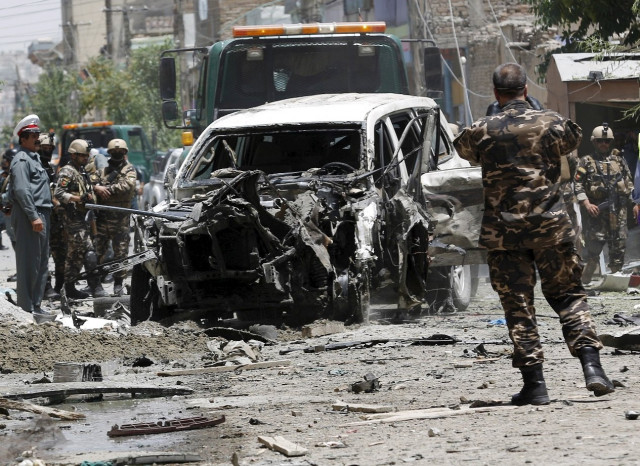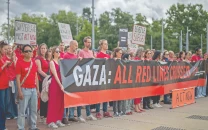Three wounded as suicide bomber targets NATO forces in Kabul
Taliban claimed responsibility for the attack

Afghan security forces stand at the site of a suicide attack in Kabul, Afghanistan July 7, 2015. PHOTO: REUTERS
The blast in the southeast of the city is the third significant attack in the Afghan capital in the last three weeks and comes a week after another NATO convoy was hit by a suicide bomber on the road to the airport.
NATO ended its combat mission in the war-torn country in December, maintaining a smaller residual force for training, leaving Afghan troops and police to face their first "fighting season" battling the Taliban on their own.
The Taliban claimed the attack in a message on their Twitter account.
The street was strewn with rubble and broken glass after the blast, which left a white SUV badly damaged and on fire.

Afghan security forces stand at the site of a suicide attack in Kabul, Afghanistan July 7, 2015. PHOTO: REUTERS
Read: Afghan parliament attack ends, seven militants killed
Kabul police spokesman Ebadullah Karimi said the attack in the southeastern part of the city was a suicide car bombing that wounded three people.
Karimi said two of the wounded were civilians who suffered minor injuries and described the third as a "foreigner", but there was no confirmation of identity or nationality.
"We can confirm an attack on coalition forces occurred in Kabul at approximately 11:30am. We are gathering further information on this incident," a spokesperson for the coalition told AFP adding that no foreign forces were killed in the attack.
Tuesday's attack comes a week after a Taliban suicide car bomber targeted a NATO military convoy on the main road to Kabul airport, killing at least two Afghan civilians and wounding around 17.
A week before that, insurgents launched a brazen attack on the Afghan parliament. Police and soldiers beat back the attack with only two civilians killed.
Read: NATO, Afghanistan agree on future military-civilian mission
But the incident highlighted the Taliban's continuing ability to strike even at the heart of the heavily-secured capital.
NATO's combat mission formally ended in December after 13 years, but a small follow-up foreign force named Resolute Support has stayed on to train and support local security forces.
Stretched on multiple fronts and facing record casualties, Afghan forces are struggling to rein in the militants even as the government makes repeated efforts to jump-start peace negotiations.
The Taliban's annual summer offensive, which began in late April, has sent civilian and military casualties soaring and threatened major cities for the first time in a decade.
A fierce battle has been going on in the northern province of Kunduz, where last month Taliban fighters threatened to overrun their first provincial capital since being toppled from power in 2001.



















COMMENTS
Comments are moderated and generally will be posted if they are on-topic and not abusive.
For more information, please see our Comments FAQ